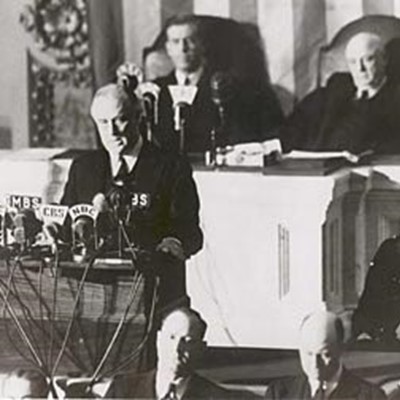
Even when we’re not aware of it, we’re using many of the same rhetorical techniques Aristotle, Cicero, Abraham Lincoln, Frederick Douglass, Winston Churchill, Martin Luther King, Jr. and other greats have employed in public speaking. Each month, our Buckley School resident students of classical rhetoric explain a rhetorical device that can improve your public speaking.
BY JENNY MAXWELL and JANA DALEY
"Never give in — never, never, never, never, in nothing great or small, large or petty, never give in except to convictions of honour and good sense."
– Winston Churchill in his famous address to Harrow School on Oct. 29, 1941
Dilly, dilly!
There are a number of rhetorical devices that address repetition.
Epizeuxis—repeating a word or phrase in immediate succession—can be used for emphasis, to show enthusiasm and inspire it, to create drama or for comic effect.
Here’s how literarydevices.net describes its uses:
The major function of epizeuxis is to create an appeal to the emotions of readers — to hit them with a bang. It is employed to inspire, encourage, and motivate the audience.
Epizeuxis examples are found in literary writings as well as political speeches. As a literary device, it furnishes freshness to the texts, and gives artistic effect to a piece. Apart from adding rhythm to the texts, epizeuxis makes the reading of the literary text pleasurable and memorable. Also, it helps in drawing the focus to a particular thought, idea, or emotion through repetition.
Examples of these effects from Shakespeare include:
- Words, words, words—Hamlet
- O horror, horror, horror—Macbeth
- Never, never, never, never, never!—King Lear
You’ll also find examples in nearly every aspect of modern life:
- Sporting events: Go, go, go
- Driving with your spouse: Turn, turn, turn!
- Meeting with a realtor: Location, location, location
- Supervising a group of unruly kids: Stop, stop, stop
 Not only our rhetorical device of the month but also of the moth.
Not only our rhetorical device of the month but also of the moth.
The term derives from a Greek word that means fastening together—epizeugnumi. There’s also a moth genus called epizeuxis.
Merriam-Webster offers a different definition of the term, one that describes fastening together syllables. (By the way, if you can give us an example of what they're describing, please email us!)
"I love scotch. Scotchy, scotch, scotch. Here it goes down, down into my belly."
– Will Ferrell in "Anchorman"
As for pronunciation, we’ve found a few variations:
- For English speakers in the U.S., the most common is:
eh-puh-ZOOX-sis - For English speakers in the U.K. and Australia, it tends to come out:
eh-pee-ZUX-iss
And if you'd like to read that famous Churchill example of epizeuxis in context, here's the full speech.






